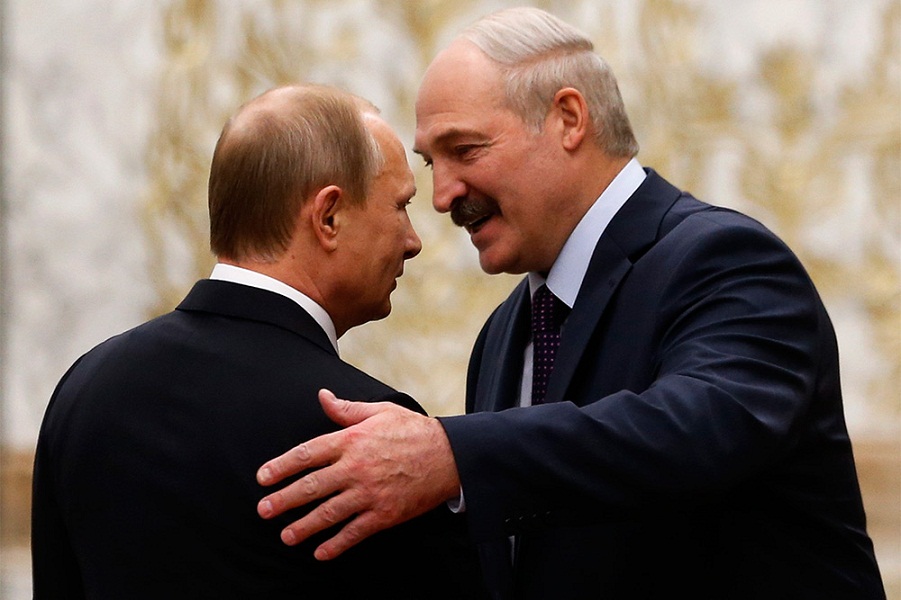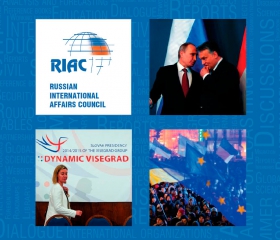The Ukrainian crisis has compelled Belarus to reassess and develop its own foreign policy. Minsk is trying to work out how it can benefit from the international relations crisis that is unfolding across Europe and is adjusting its position on the international stage accordingly. However, these changes have been triggered primarily by economic, rather than political or ideological considerations. But the question remains: Will Minsk be able to maintain the purely economic nature of this process?
The Ukrainian crisis has compelled Belarus to reassess and develop its own foreign policy. Minsk is trying to work out how it can benefit from the international relations crisis that is unfolding across Europe and is adjusting its position on the international stage accordingly. However, these changes have been triggered primarily by economic, rather than political or ideological considerations. But the question remains: Will Minsk be able to maintain the purely economic nature of this process?
An Equilateral Triangle
Almost immediately after the revolution in Kiev on February 22–23, 2014, Belarus outlined its official position on the Ukrainian issue, which turned out to be an equal distance from those of both Kiev and Moscow.
At a meeting with the members of the Belarusian Security Council in March 2014, President Alexander Lukashenko announced, without assessing the legality and nature of the change in power in Ukraine, that his country would cooperate with the new government in Kiev. At the same time, he condemned the Maidan protests as a political phenomenon and a mechanism for forcing a change in power. This is hardly surprising, given the unsuccessful attempt to carry out a “colour revolution” in Minsk in December 2010 and the upcoming presidential elections. Further escalation of the Ukrainian conflict has not led to a disturbance in the balance of Mink’s foreign policy. Lukashenko gave everyone their fair share: Crimea is de jure Ukrainian, but de facto Russian; Russia has been forced to play a role in Eastern Ukraine; and the conflict with the Donetsk and Lugansk people’s republics can be resolved through negotiations.
Minsk’s neutrality with regard to the Ukrainian question is a reflection of its pragmatic foreign policy: Russia and Ukraine and Belarus’ main foreign policy partners. According to data from the State Customs Committee of the Republic of Belarus, Russia accounted for 48.7 per cent of the country’s trade turnover in 2014, while Ukraine accounted for 7.5 per cent. Moreover, as Lukashenko candidly shared at a traditional news conference for members of the Russian media in autumn 2014, Minsk is wary of economy-crippling sanctions from the West as a response to its support for Russian policy (much like it was threatened with sanctions on the issue of Georgia in 2008 and that of Ukraine in 2015). “Don’t strong-arm me on the issue of Crimea! Don’t push and shove me like you did with Abkhazia…” the President said. “I presented Medvedev with a list of things that would happen if we officially recognized Abkhazia. It would be like the sanctions against Russia now, only an order of magnitude worse”. The Belarusian leadership does indeed have cause for concern: EU countries (combined) account for more than 30 per cent of the country’s total exports and 20 per cent of its imports. It would seem that Minsk intends to profit from the Ukrainian crisis, both economically and politically.
Turning Crisis into Opportunity
Minsk is putting this business mantra to political use. And its main resource is the neutrality it has professed from the very beginning of the Euromaidan protests. The Ukrainian conflict has created conditions whereby Belarus’ geopolitical proximity is seen by European politicians as a positive rather than a negative, something that Alexander Lukashenko was quick to exploit for his own political and economic ends. The most glaring example of this was when Minsk offered itself up as the venue for talks on the Ukrainian issue. As it stands, the negotiations that took place in Minsk can be considered the most effective so far, with both Western Europe and Russia viewing the Minsk Protocol signed on February 12, 2015 as the only possible compromise mechanism for settling the Ukrainian crisis today.
The most obvious reason for Belarus stepping up its foreign policy with regard to Europe is the propaganda effect it will have in the run-up to the presidential elections in October 2015. The prospect of a thaw in relations with Europe, which was made that much more tangible thanks to the “Minsk Process” initiated by Belarus, will no doubt have an effect on the voting public. An opinion poll conducted by the Independent Institute of Socio-Economic and Political Studies in autumn 2014 revealed that Lukashenko’s efforts as mediator in the Minsk negotiations really did help improve his image at home, with 60 per cent of the population welcoming Minsk’s role as the venue for talks on the issue of Ukraine.
The second reason for Minsk’s increased foreign policy activity in Europe is linked with the country’s economic interests in the West, which have thus far remained unfulfilled as a result of Belarus’ political leanings, and which Minsk has been trying to promote since the beginning of the Ukrainian crisis. In 2014, after the failure of the Eastern Partnership Summit in Vilnius, Belarus reached an agreement with Brussels on the implementation of a “Transitional Phase”, thus ushering in a new format of relations with the European Union. According to official statements, this format primarily involves cooperation in trade and investment, leaving political questions unresolved, but not ignoring them altogether. Discussion of the project is not being forced in the media or at the political level. What is more, the Ministry of Foreign Affairs of the Republic of Belarus initially did not even acknowledge the existence of the programme. This is why one would have been forgiven for thinking that the rapprochement between Belarus and the European Union in the spring of 2014 was of a temporary and accidental nature. However, preparations for the Eastern Partnership Summit in Riga showed that Brussels had become increasingly interested in Belarus despite numerous failed attempts in the past to integrate it into Europe. For its part, Minsk seemed equally interested in intensifying economic relations with Europe, despite the political differences between the two sides. In April 2015, when the expert community was busy discussing the future of the Eastern Partnership, Alexander Lukashenko stated bluntly after a meeting with the European Commissioner for Enlargement and European Neighbourhood Policy Johannes Hahn that the programme should be restructured and that it was necessary to move “from the conventional policy to closer and more concrete cooperation, based on solving economic problems”.
An additional catalyst for the renewed interest of Belarusian foreign policy in the West was the “sanctions war” that begun in 2014 which, though indirectly, nevertheless hit the country’s economy. In 2015, for example, the European Bank for Reconstruction and Development forecast a 2.5 per cent drop in GDP for the year, which is partly due to the fact that the Belarusian economy is dependent on Russia through trade relations, money transfers and bank assets. At the same time, there has been reduced economic activity in general with Europe: in 2014, trade turnover between Belarus and Russia contracted by 5.8 per cent (to $37.2 billion) compared to 2013, while trade with Kazakhstan decreased by 0.5 per cent (to $976.1 million). As a result, the newfound European trajectory of Belarus’ foreign policy is not only part of the pre-election campaign, but also an attempt to offset the costs of unfavourable economic conditions in the East with the thus far untapped reserves of the West.
An Unstable Equilibrium
The model for the development of relations with the European Union, which Minsk has aspired to follow since the beginning of the Ukrainian crisis, can be successful in theory. Trade relations between Belarus and the European Union have developed over the past few years despite artificially created barriers. Removing these barriers will no doubt open up hidden growth reserves, especially since trade relations between Belarus and the European Union have cooled somewhat since 2012 (1, 2).
Getting the go-ahead from Brussels to develop economic cooperation will not adversely affect the other vector of Belarusian foreign policy, namely Eurasian integration and strategic partnership with Russia. At first glance, it all seems very convenient and harmonious. But this model is extremely unstable, especially during a crisis in international relations. The geopolitical situation can only be described as an “unstable equilibrium”: if the system deviates even slightly from the equilibrium state, the forces of the system cause it to move even farther away.
In the case of Belarus and its attempts to adhere to this “unstable equilibrium”, these elements are already visible. At the “Minsk after Riga” expert meeting on the prospects of cooperation between Belarus and the European Union in May 2015, for example, Charge d’Affaires of the European Union delegation in Belarus Rodolphe Richard commented on the “multi-vector” nature of Minsk’s foreign policy: “It’s good to be at the crossroads. But it’s not very comfortable to do the splits for a long time”. European politicians are not interested in pragmatic cooperation if it is not supported by a political “civilizational choice”. Brussels fully demonstrated this approach on the eve of the Eastern Partnership Summit in Vilnius, when the “Fule list” (a list of reforms needed to move towards European integration), which was ignored by Ukraine, did not stand in the way of the country being recognized as an associate member of the European Union. Now the very same principle is being applied in relations with Belarus. This is why experts in Lithuania and Poland, two EU countries that have traditionally taken it upon themselves to “teach” the former Soviet states about “democracy”, have been sceptical about the intensification of the economic dialogue between Minsk and Brussels. In an interview with Belarusian media, for example, Lithuanian political analyst Laurynas Kasčiūnas, who has close ties with the ruling elite in the Republic of Lithuania, said bluntly: “The European Union, acting on the principle of ‘more for more’, will at some point push some issues that may run counter to the foundations of the Lukashenko regime”.
After the events in Ukraine, it is doubtful that the Belarusian establishment still harbours any illusions about the reality of engaging in a dialogue with the European Union as equals. Nevertheless, even Belarusian observers who traditionally cite “European values” in their criticism of the country’s leadership, recognize the fact that the national elite is distancing itself gradually from Russia. “It is not that the Belarusian authorities are becoming pro-European; it’s that they are no longer pro-Russian. And this negation is extremely important,” noted Andrei Kazakiewicz, Director of the Institute of Political Studies Palitycznaja Sfiera (Political Sphere), during a session at the 12th Annual Session of the Warsaw East European Conference entitled “Belarusian National Confrontation to ‘Russkiy Mir’” in July 2015.
Two circumstances have exacerbated the situation. First of all, this wavering among the elites can only undermine the country’s image as a strategic ally of Russia; Minsk receives essential loans from Moscow and Eurasian financial structures. Secondly, the evolution of the Belarusian establishment may contradict the processes that are developing within society. According to an opinion poll conducted by the Belarusian Analytical Workroom in Warsaw (which can hardly be charged with being partial to Lukashenko or the Kremlin), pro-Russian sentiment has grown amongst Belarusian citizens since the beginning of the Ukrainian crisis, with 60 per cent opting for eastern integration over integration with the West.
The “pro-European” political processes that are taking place right now in Belarus are hardly dominant in the country’s social and political life. Nevertheless, just which side of the geopolitical divide Minsk falls on will soon become a top priority. A distinctive feature of an “unstable equilibrium” is the fact that even the tiniest of jolts is enough to rock the balance significantly. And there is no doubt that Belarus’ western partners will only try to intensify these “jolts” in its own favour, which could lead to the socio-political destabilization of the country. As a result, the Belarusian political elite, in carrying out its multi-vector policy, will inevitably need to put a stop to these negative trends. This is where the Ukrainian elites failed. The Belarusian leadership may find it helpful to look at where the evolution of its current foreign policy began – the Euromaidan protests in Ukraine.






